today
| последние новости |
| 2024 |
| 2023 |
| 2022 |
| 2021 |
| 2020 |
| 2019 |
| 2018 |
| 2017 |
| 2016 |
| 2015 |
| 2014 |
| 2013 |
| 2012 |
| 2011 |
| 2010 |
| 2009 |
| 2008 |
| 2007 |
| 2006 |
| 2005 |
| 2004 |
| 2003 |
| 2002 |
similar
- ‘NORD-OST’: IS THE SONG AND DANCE OVER?
- ‘NORD-OST’ IS OVER - LIFE GOES ON!
- About the Russian Federation's upholding 'Nord-Ost'
- Relatives of hostages found their loved ones shot
- Two gases were used
- Interview with former 'Nord-Ost' hostage Svetlana Gubareva
- Why did she shoot him?
- 57 часов в театре
- The buried truth
- THE "LEPERS" OF RUSSIA
- Mercury was snuck into lawyer's car
- Poisoned by the government
- Kadyrov could be summoned to Moscow District Military Court
- Who Murdered These Russian Journalists?
- Looter-prosecutors
- Why they surrounded the Beslan children
- The explosion in Pyatigorsk has been recognized as a terrori
- The ‘nice guys’ are on the warpath
- September 3rd to be a day of solidarity in the fight against
- "Here there will be no religion or politics"
- Pushed around on Triumph Square
- The memorial candles of Beslan
- 74%of Russians accuse the government of concealing the truth
- Chechnya, the endless war that Moscow cannot win
- Nord-Ost: life before and after
- At Dubrovka 130 white balloons were released into the sky
- Powerful bomb found in the National Theatre and Concert Hall
- Victims of terrorist attack on Dubrovka
- The Edge of Time
- EXPLOSION IN MINSK
- Осетины, образцовые жертвы
- South Ossetia historian writes about 2004 Beslan tragedy
- New York premiere of the ‘Nord-Ost’ hostage seizure
- Terrorist attack in the Oslo government quarter
- On August 30th journalist A.Politkovskaya would have been 54
- Parisian 'Nord-Ost'
- RT на русском. Акция в память о трагических событиях в Театральном центре на Дубровке
- Потерпевшие обжаловали в ВС приговор пособнику теракта на Дубровке в части компенсаций
- России нужен закон о статусе жертв терактов
| Ustinovskaya, Yekaterina |
|
В День памяти Уже 22 года подряд в этот день я включаю песню rammstein Nebel, она ассоциируется с тобой. А 10 лет назад я прочитал пер... |
| 12/12/24 23:18 more... |
| author Аноним |
| Ustinovskaya, Yekaterina |
| Уже 22 года... |
| 24/10/24 13:38 more... |
| author Аноним |
| Kurbatova, Christina |
|
Детки Милые, хорошие наши детки!!! Так просто не должно быть, это больно, это нечестно, это ужасно. |
| 30/06/24 01:30 more... |
| author Ольга |
| Grishin, Alexey |
|
Памяти Алексея Дмитриевича Гришина Светлая память прекрасному человеку! Мы работали в ГМПС, тогда он был молодым начальником отдела металлов, подающим боль... |
| 14/11/23 18:27 more... |
| author Бондарева Юлия |
| Panteleev, Denis |
| Вот уже и 21 год , а будто как вчера !!!! |
| 26/10/23 12:11 more... |
| author Ирина |
| Nord-Ost's Eternal Hostages |
| Written by MK.ru | ||||||||||||||
| Среда, 27 Октябрь 2010 | ||||||||||||||
|
The effect of «harmless gas»: 8 years later people live on drugs, have become blind, deaf, insane, and given birth to disabled children Today is the eighth anniversary of the tragedy that is abbreviated as On October 23rd, 2002, gunmen seized the Dubrovka theater complex in Moscow. 912 people became hostages. On October 26th, at 5.30 am, a secret gas was introduced into the theater building. As a result the terrorists were eliminated and 130 hostages were killed. Years passed. The Russian people turned another sad page of our history, and happily forgot the tragedy. So it is with human memory — all details, even important events, gradually disappear. Today the former hostages who were disabled, mothers who lost their children, children who were in an instant deprived of parents, all were left alone with his grief. To this day they try to uncover the truth, which, in their opinion, the state buried along with the victims of In their search for truth, survivors of the attack came to the Strasbourg Court.
Tatiana Karpova, mother of slain Alexander Karpov, remembers: «After the storming of the auditorium representatives from the headquarters staff came to the polytechnic university to see the relatives (of the hostages). The hall became deathly silent. The assault went brilliantly! All the terrorists were killed! No casualties among the hostages! The entire hall applauded and shouted for joy. Everyone thanked the authorities and state officials for saving the lives of family and friends. They thanked the Lord God. At this point into the room ran some clergy, and a service began. The hall fell to its knees. Everyone wept with happiness… »And then I saw a group of doctors. Despite the general jubilation, their faces were far from happy. Tanya, it looks the who auditorium is dead!" We met with the Karpovs — Sergey and Nikolai, on the outskirts of Moscow in a quiet, deserted cafe. They are two of the founders of the And since then getting to the facts, learning the truth about the terrorist attack has become for them the meaning of life. First they waited for an answer from the Russian justice system. It never came. And so they filed a judicial complaint with Strasbourg. In their complaints to the European Court, it states that during the investigation of terrorist attack Russian authorities violated the 2nd, 6th and 13th articles of the European Convention on Human Rights, which guarantee the right to life, to a fair trial, and effective legal mechanisms. Meanwhile the Karpovs discuss questions that torment them to this day. *** Sergey: «You know, all of us have long since been forgotten. Brushed aside like annoying flies. For the first couple of years the
When will they announce the results of the Strasbourg court? Nikolai: «We're already at the finish line… The first statement was sent back in 2004. For long time the court was deciding even whether to consider our complaint. This process took several years. In Strasbourg there are long lines, especially with regard to Russia. Finally our case was taken into consideration. We sent them 12 kilograms of documents on the terrorist attack on Dubrovka, statements of witnesses, video and audio recordings.» What kind of questions did the representatives in Strasbourg have, in addition to the gas? Nikolai: «Unfortunately we cannot divulge this. Thanks to the Russian Federation, our case has been accepted at Strasbourg in closed chambers and not recommended for disclosure. I can say one thing: the questions at Strasbourg were rather tough, and unpalatable to the (Russian) government. We still believe that the assault was unnecessary, and that it would've been possible to avoid so many casualties had they planned a competent evacuation and for medical assistance to the hostages.» *** Nikolai: «The »At some point a doctor was examining a hostage and said that it looks like a narcotic poison, we need to inject naloxone. This drug helps to save drug addicts after an overdose. One hostage was injected with the medication and looked like he was doing better. Then the doctors got on the radio and started calling each other: anyone with naloxone, inject it! And then it became a mess. They didn't mark who got the medicine and who didn't. It turned out that one victim received two or three doses, and another nothing. The drug is very scary — an extra injection could lead to heart failure." Sergey: «They didn't sort the living hostages from the dead. People were stacked on the sidewalk in front of the theater. Then they were all loaded into buses and vans, thus killing From the criminal case materials: testimony of health care provider A. V. Nedoseykina (Vol. 120, page 115): «There was bad sorting — living hostages were put in the bus interspersed with corpses of the dead hostages. Lack of information about the name of substance used during the raid played a negative role in the provision of medical care…» (From the book Nikolai: «There are cases known, such as when a man was put into a body bag. They took him for dead, but after a while the bag started moving. One woman who was mistakenly taken to the mortuary suddenly came to life. A week later she died in intensive care.» Sergey: «Despite the fact that many victims of the gas attack started vomiting, they were taken out of the theater and laid on their backs. Hostages stuck on the bus with their heads lolling back. People choked on vomit and died. When they unloaded, some were dead. All in all 58 died in the buses and hospitals.» From the criminal case materials: testimony of health care provider O. V. Beljakova (Vol. 120, page 130): «The bus did not have any medicines or medical instruments. There were 22 survivors on the bus, one of whom died. The victims were distributed chaotically — some were sitting in the seats, and others lying on the floor. This played a negative role. Our work would have been helped by having known the antidote.»
Nikolai: «There were a lot of ambulances, but for some reason the hostages were evacuated mainly by bus. And the ambulances returned empty. Tell me, what was the idea of having buses transport unconscious people? One driver said to another: I know where the nearest hospital is, we'll convoy. And a number of buses worked their way through traffic jams and trudged over to a nearby hospital where they weren't expected. The doctors weren't given any specific guidance by anyone. They didn't know which hospital to go to, where they were ready to accept casualties. As a result, six buses arrived at City Hospital #13th at the same time. The clinic doctors threw up their hands: we can't process 350 all at once! Three buses turned around and went to the Sklifosovsky, but they weren't expected there, either. For 15 minutes the gate guard wouldn't let buses full of victims into the grounds. »But City Hospital #15, which was prepared to receive hostages, was empty. The doctors at this clinic said: we discharged all of our patients that could move and opened up wards for the hostages, we practically emptied the whole hospital and called in surgeons, critical care specialists, and nurses. But only a few survivors were brought to them. From the criminal case materials: testimony of G. I. Kruglova (health worker who took part in transporting the hostages): «They opened the rear door of the bus and literally threw in two victims in critical condition. On the question of where to take them, they said wherever we want.» Sergei: «In 60 percent of the deaths the autopsy states: no sign that treatment was given. More than half the hostages simply did not receive any assistance. Many had skinned necks and arms from being dragged on the asphalt.» From the criminal case (vol. 1, page 120): «Children in serious condition were not delivered to specialized hospitals, costing the lives of ten children, five of whom received no medical assistance whatsoever.» How did you find out the details of cases involving almost every affected family? Sergey: “For these 8 years we have been very close — hostages, victims. We know the problems of each family. We have all become one family! We constantly call each other, meet up, and support each other not only morally but also financially. So today we are ready to sign for each and every tragedy.” *** Nikolai: «And then pathologists did their formal autopsies of the victims of the terrorist attack. All the documents were compiled in one format, cut and paste. It turned out that the internal organs of a Sergey: «We are still not allowed to review all the case materials. We were only allowed to look at the medical examination. When we read this we got the impression that a bunch of disabled and seriously ill people had gathered at According to the official press secretary of the Austrian Embassy, Wolfgang Banja: former hostage and citizen of Austria, Emilia Sergey:
*** The head of the investigation team was Vladimir Kolchuk. You also had problems with him? Sergey: «It was problematic just to get in to see him. Normal communication didn't work. Even in the court he didn't answer questions, and frankly was rude to the judge and to us. What can we say? Now the investigation is complete and Kolchuk got a promotion. He was assigned the investigation of a »Once we asked him about looting after the assault. Kolchuk sighed and said people are paid meager salaries, so they walk past a sleeping hostage, pick up a purse and keep going. He said it so calmly. «At the trial they raised the issue of looting. They found the guilty party. Everything was blamed on a man who died in a car accident a month before the trial. Case closed. No other names appeared in the case.» There were rumors that the terrorists get away? Sergey: «According to the results of the investigation, everything checks out, no one got away, everyone was killed during the assault. But we have one video that was made from the window of a building opposite the theater. It recorded that after the assault they pulled a handcuffed man out. They threw him down by the porch. A woman walked up and shot him. The corpse was dragged back into the building. We presented the film to the investigator. Later he denied our speculation that perhaps the surviving terrorists were shot. He said that there was no sound of a shot on the film, that the sound was from breaking glass.» Three people who were not hostages managed to get through all the cordons and enter the building on Dubrovka. Terrorists shot all of them. How could they have managed to enter the building? Sergey: «First to be killed was a young girl, Olga Romanova. She went through the cordon during the first hours after the capture when there was chaos everywhere. But how did Vasilyev and Vlakh get by? The third man — Gennady Vlakh — went to the theater looking for his son, Roman. And somehow he also got by all the checkpoints. His son was not in the auditorium and so Vlakh was shot. And then his body was cremated by mistake along with the terrorists. Galina, the wife of the deceased, couldn't find her dead husband for 8 months. They didn't even give her his ashes. Into a grave Vlakh’s wife and mother put an ordinary ceramic vase with a Gennady's »We tried to call Galina Vlakh. We were warned, however, that after all that happened the woman has never been able to recover. Today she flatly refuses to think about the events. Galina never comes to commemorative events dedicated to the tragedy at Dubrovka." You've been accused in the fact that you have filed suits against the government for a million dollars? Sergey: «That was a PR campaign to get attention and unite people affected by the attacks. And money? What do you mean? We knew that we wouldn't see a cent.» *** Nikolai: «Not all the hostages wish to communicate with us after the incident. Many withdrew from everything; some still don't want to stir up the past. The backbone of our organization: relatives of those killed, and those who need serious medical care. You can't even imagine how many people after swallowing an allegedly harmless gas became disabled.» Sergey: «Almost all the illnesses are associated with brain hostage. After people swallowed the poison gas, they had disrupted blood circulation and respiratory function. 12 are completely deaf. Many have severely decreased vision. Hostages are diagnosed with memory loss. A person may go to the store and buy a kilo of salt three times. Virtually all have seriously impaired renal, liver, and digestive function. Some got sores right away, while others later. People were discharged after 2 to 4 days, but then there were repeat hospitalizations, which they don't write about much. »In private the doctors admitted: what you want, you inhaled poison gas! But on paper they didn't write this diagnosis. They didn't specify any symptoms. Although in the investigation, in the testimony of the paramedics, there was talk of opiate poisoning, the physicians didn't hide the fact that they smelled nerve agent. But such evidence was carefully erased." *** You are fighting for former Sergei: «There is a law that people who during their military obligation were in captivity are allowed to be released from their service. But this is not the case with Nikolai: «A terrorist attack takes place and people are alone with their wounds and sores, no one helps them. People are disabled, and are unwanted. Many hostages were unable to cope. There are instances when some of our women met each other in psychiatric hospitals. Relatives of the victims were also on the brink. One woman after the death of her son went to say goodbye to him in the morgue. Then she took a cab to a high bridge and threw herself off.» Sergey: «Some women said that after the assault they signed something saying that they shouldn't have children for at least five years. But one hostage at that time was already pregnant. The baby was born heavy. In addition to a diagnosis of cerebral palsy, she had a whole bunch of other diseases. The woman is raising the child by herself. Over and above this sick child, her two parents were disabled at Chernobyl. Every cent she earns she spends on treating her loved ones.»
*** Sergey: «Now they pay (relatives of) the deceased a million rubles. Back then they gave 100 thousand (about $4,000). Victims were paid 50 thousand, And 14,200 rubles (about $560) were for the burial — it wasn't given out, but allotted for ritual services — a poor wreath, a little sheet, slippers, and the least expensive coffin. One woman at »The authorities hoped that the Russian people would swallow the tragedy and not check things out. But we began to dig. It was stated at the inquest that the forensic examinations had many inconsistencies. But investigators just dismissed it, everything's fine they said. The parents of Nikolai: «Also, many employees at Dubrovka noted the fact that among the terrorists they saw people who worked with them in the same building. In this case they were talking about workers who were renovating a nightclub. In the theatrical center there was a nightclub.» From the criminal case (volume 1, page 93): «Employee of the theater was taken hostage and among the terrorists he recognized one of the employees from the gay club. In the auditorium he was not masked, and slept on seats in the immediate vicinity.» Nikolai: «At first there was a version going around that the theater building had pre-positioned weapons and explosives. But the prosecutors wouldn't allow the issue to be raised. Then there was the terrorist attack in Beslan. There was also talk about the attack being prepared in advance. They found that the stage in the assembly hall of the school had been broken into, as well as the library floor. The terrorists probably hid weapons under there. But just as soon as they stated looking at this the assembly hall unexpectedly burnt down.» Sergey: «When we had the money we often held an event, called 'No Terror', and organized music festivals. The West and some Russian organizations sponsored us. We organized a memorable event at the railroad worker palace of culture, in the Cosmos Hotel. But then they pulled the plug on us. Now we can't rent space for our meetings. When they hear the word Did Nikolai: It is true that the Hero of Russia medal was awarded to the chemist responsible for the use of gas during the assault? Sergei: «Yes, we received this official information from the prosecution. Five people were awarded Hero of Russia: FSB First Deputy Director General Vladimir Pronichev, who led the hostage rescue headquarters staff, General Alexander Tikhonov, the head of the Special Forces Center, the chemist responsible for the gas used during the assault, and two officers from the Alpha and Vympel elite special forces units. And the fact of the matter is not that they used this gas during assault. What’s frightening is that no antidote was developed against the gas. Incidentally, the name of the professor responsible for the gas was not disclosed.» Views: 18180 |
Powered by AkoComment Tweaked Special Edition v.1.4.6 |
||||||||||||||
| < Prev | Next > |
|---|



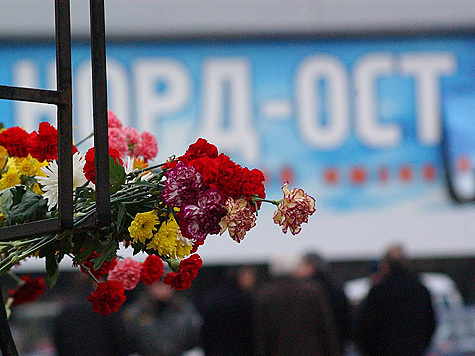
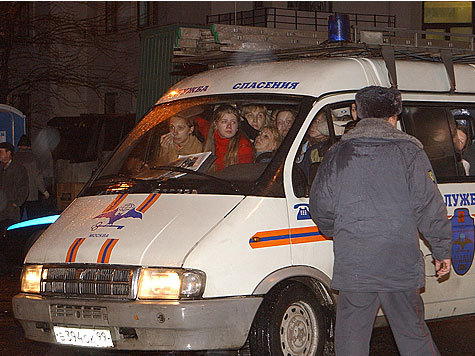
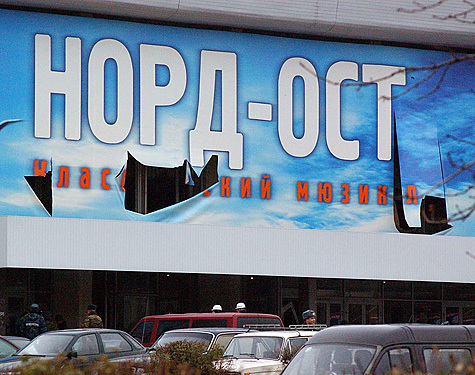
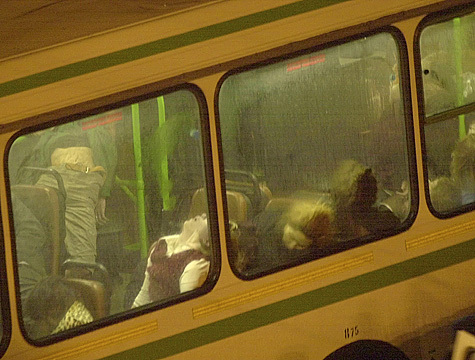
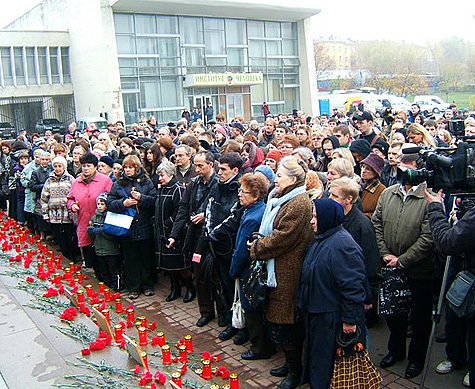
 Comments (6)
Comments (6)
